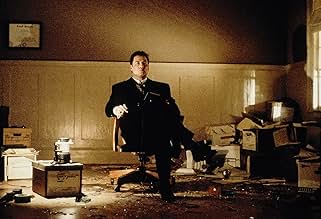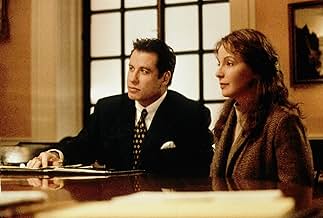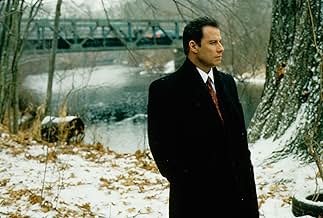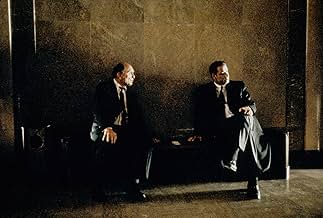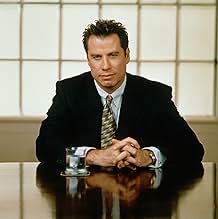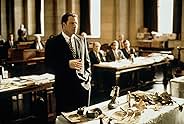Um tenaz advogado assume um caso envolvendo uma grande corporação responsável por várias pessoas serem diagnosticadas com leucemia devido à contaminação do abastecimento de água da cidade, c... Ler tudoUm tenaz advogado assume um caso envolvendo uma grande corporação responsável por várias pessoas serem diagnosticadas com leucemia devido à contaminação do abastecimento de água da cidade, com o risco de arruinar sua firma e sua carreira.Um tenaz advogado assume um caso envolvendo uma grande corporação responsável por várias pessoas serem diagnosticadas com leucemia devido à contaminação do abastecimento de água da cidade, com o risco de arruinar sua firma e sua carreira.
- Direção
- Roteiristas
- Artistas
- Indicado a 2 Oscars
- 5 vitórias e 10 indicações no total
- Mr. Granger
- (as Daniel Von Bargen)
- Direção
- Roteiristas
- Elenco e equipe completos
- Produção, bilheteria e muito mais no IMDbPro
Avaliações em destaque
In this film, based on a very fine book about real events in the Boston area, we have a rather rare example of a lawyer trying so hard he defeats his own cause. Yet at the end he may have brought about a greater social good. Jan Schlictman (played with smarmy aplomb by John Travolta) is a seasoned plaintiff's lawyer in personal injury cases who knows all the tricks, both in pre-trial negotiation and before a jury. He is persuaded by an associate to look into a claim by a small community that its water has been poisoned by industrial waste resulting in the deaths of at least eight children from leukemia and other ailments. The case captures his attention and before long the entire resources of his four-partner firm are concentrated on it. They are up against a local tannery owner and two huge corporations, Beatrice and W&R Grace. Beatrice is represented by Faucher (a stand-out performance from Robert Duvall) a crusty veteran of 45 years litigation (and Harvard Law School lecturer), and he doesn't have much trouble cutting Jan down to size.
Despite the escalating cost Jan doesn't seem to know when to stop. His partner James (another gem-like performance from William H Macy) does everything he can to raise money, including applying for credit cards from banks as far away as Fargo, North Dakota (those who saw Macy in "Fargo" will chuckle over that one.) Total disaster is averted but it seems that Jan has been fighting the wrong battle.
To fit the mood the lighting is dull (surely the Boston Courts are not quite as gloomy as portrayed) and the weather awful. I've never seen it rain so much in a movie. Against this dismal backdrop the performances are luminous. Apart from those already mentioned there is John Lithgow (of "Third Rock from the Sun" fame) as a conceited judge, Kathleen Quinlan as a bereaved parent, Bruce Norris as Cheeseman, Grace's super nerd lawyer, Dan Hedaya as O'Reilly the evil tannery owner and Stephen Fry as a very English geologist. And who should pop up at the end as a bankruptcy judge but Kathy Bates.
This is a case where I have read the book (by Jonathan Harr) and for the movie the film makers have rather sidelined the plaintiff/victims and focused more on Jan's manic prosecution of the case. This helps the drama but does give the impression that the plaintiffs were helpless bystanders. This was not so, as the book shows.
As a movie this one succeeds very well. Some have complained it's a bit slow and requires rather too much legal knowledge from ordinary filmgoers but there is plenty of tension and the ending is as satisfactory as one gets in real life. It's a movie to make a lawyer cringe, and that is probably recommendation enough.
"A Civil Action" was a pleasant surprise because it is not only like neither of those films, but also because it is a good film starring John Travolta. While he had his moments in the spotlight for good reason (think: "Pulp Fiction") his movies are generally not that great. But that's just a personal opinion and I may be wrong.
Still, "A Civil Action" is a great courtroom film. For one, it's a true story (which doesn't necessarily say much), and it is told with restraint, quietness and respect for the characters involved (which should be saying a lot). It takes the best from "Silkwood" and "Verdict" and it gives us people who are real and who engage in battle the way we imagine real people would. They don't have dramatic moments in the courtroom upon which an unreal stillness descends so as to be shattered at the end of the speech by the thunderous sound of unanimous, emotionally-fraught clapping.
John Travolta is great here and so is the rest of the cast, among them William H. Macy, Kathleen Quinlan, Sydney Pollack, John Lithgow, Stephen Fry (in a small cameo role), Kathy Bates (in an even smaller cameo role) and the great Robert Duvall. In the end, it is Duvall who steals the show in his quiet, unemotional musings, advice-givings and deliberations with Travolta. He embodies the restraint for which the film strives.
"A Civil Action" is quiet in its proceedings and, consequently real. It tells the story of a lawyer who reluctantly accepts a case having to do with the contamination of water and the deaths of many children in a small town and becomes obsessed with it to the point of going bankrupt. His obsession mirrors the self-destructiveness of Paul Newman's lawyer in "Verdict," and it has real results. His adversaries are not evil people, per se (think Jack Nicholson in "A Few Good Men"), but people who are simply doing their jobs damn well, defending their interests. We shouldn't expect them to cave in to pretty speech-making, nor should the jury.
And watching "A Civil Action" we don't and it doesn't. The personalities clash, personal tragedy is pitted against financial burdens of the legal process, and it yields startling conclusions about the American Justice system. And that is what "A Civil Action" chooses to focus on more so than the true story it tells (though it doesn't ignore it either). The film shows the price of justice and how justice is understood in the legal process. In fact, it draws a very fine dichotomy between non-legal justice and legal justice and shows how hard it is to get "justice" in a legal setting. Needless to say, it becomes a very expensive ordeal full of re-interpretations of the law and annoying manipulations of it. What we can gather from the story, however, is that we should be grateful for people who are willing to go to extreme lengths, at great personal cost, to define justice on their own terms and to fight for it.
*** out of ****
Robert Duvall is excellent as his opposing counsel, and his character's interplay in the courtroom drama with Travolta is worth seeing the film for alone. Duvall plays quirky characters like few else in modern cinema.
Given the job of prosecuting a tannery over water pollution that has led to the death of many children, this is well written and structured - as well as being brilliantly acted and well directed.
The one complaint I would have is that this petered out a little in the finish, which was perhaps inevitable as it's a true story, and sometimes the climax of real life isn't as good as in fiction.
I approached this film with firm expectations. I work as an environmental consultant and in part of my law training I was advised to read the book as it was a good case study (albeit a 500 page case study) on a environmental case. The book was fascinating if a little heavy in detail. For the film I knew that much of it was going to be trimmed but I didn't realize how much. The `trimmed' bit is the whole case! There is none of the trial instead any court room scenes are more focused on the characters than the case.
As a film this still plays well and is entertaining if not enlightening or interesting. It still carries the mantle of being `true' but without any of the book's case detail it is never more than a Grisham-esque drama despite having a better ending.
The cast are great easily turning out for a worthy film and they are rewarded because the characters get much better treatment than the facts. Travolta does well but doesn't manage to be as real as the book's portrayal of Schlichtmann. Duvall is good while the rest of the cast are very much support but manage to be deep. When names like William H Macy, Shalhoub, John Lithgow, Kathleen Quinlan, Stephen Fry, Dan Hedaya and James Gandolfini are all in support then you rightly expect it to be a very worthy film.
Overall this is a good film that is entertaining. There is a more powerful, more interesting and moving captivating story at it's heart anyone wanting that story should read the book.
Você sabia?
- CuriosidadesThe real Jerome Facher was thrilled at the way he was portrayed by Robert Duvall.
- Erros de gravaçãoAl Eustis tells Jan he won't pay the amount of money to settle the lawsuit because once the amount is disclosed to the public, they'll file lawsuits as well. With all his years of experience in civil law, Jan should've known this is only an excuse because all contract settlement terms will remain confidential to any outside party, as the judge states at 1 hour and 30 minutes into the movie.
- Citações
Jan Schlichtmann: [narrating] The odds of a plaintiff's lawyer winning in civil court are two to one against. Think about that for a second. Your odds of surviving a game of Russian roulette are better than winning a case at trial. 12 times better. So why does anyone do it? They don't. They settle. Out of the 780,000, only 12,000 or 11/2 percent ever reach a verdict. The whole idea of lawsuits is to settle, to compel the other side to settle. And you do that by spending more money than you should, which forces them to spend more money than they should, and whoever comes to their senses first loses. Trials are a corruption of the entire process and only fools who have something to prove end up ensnared in them. Now when I say prove, I don't mean about the case, I mean about themselves.
- Cenas durante ou pós-créditosThe producers wish to thank the people of Boston, Waltham, Northbridge, Charlestown, Dedham, Brimfield and Palmer, MA.
- Versões alternativasIn the North American prints, the 1985 Touchstone Pictures logo played first, followed by the 1995 version of the 1987 Paramount Pictures plays at the beginning. The international prints had the logos alternating with Paramount played first followed by Touchstone. The North American prints ending it with the Buena Vista Pictures Distribution disclaimer, followed by the closing version of the Paramount Pictures and Touchstone Pictures logos. The international prints meanwhile had also removing the Buena Vista references and it goes directly to the closing version of Touchstone Pictures and Paramount Pictures logos.
- Trilhas sonorasHard Workin' Man
Written by Jack Nitzsche, Ry Cooder, Paul Schrader
Performed by Don Van Vliet (as Captain Beefheart)
Courtesy of MCA Records
Under license from Universal Music Special Markets
Principais escolhas
- How long is A Civil Action?Fornecido pela Alexa
- What did Judge Skinner do that Jan didn't like?
- Why did Facher exhibit odd behaviors?
- What is an 'orphan'?
Detalhes
- Data de lançamento
- País de origem
- Idioma
- Também conhecido como
- A Civil Action
- Locações de filme
- Empresas de produção
- Consulte mais créditos da empresa na IMDbPro
Bilheteria
- Orçamento
- US$ 75.000.000 (estimativa)
- Faturamento bruto nos EUA e Canadá
- US$ 56.709.981
- Fim de semana de estreia nos EUA e Canadá
- US$ 70.079
- 27 de dez. de 1998
- Faturamento bruto mundial
- US$ 56.709.981
- Tempo de duração1 hora 55 minutos
- Cor
- Mixagem de som
- Proporção
- 1.85 : 1
Contribua para esta página



